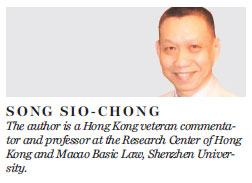CE's role as chancellor an asset to HK
Updated: 2016-01-11 07:58
By Song Sio-chong(HK Edition)
|
|||||||||
Song Sio-chong says the supervision of HK's tertiary education is legally and historically the responsibility of the executive - not judicial - branch of government
Chief Executive Leung Chun-ying recently appointed Arthur Li Kwok-cheung, former secretary for education and manpower, as chairman of the Council of the University of Hong Kong (HKU). Critics of the appointment have questioned the CE's power to appoint council chairmen and asked why the CE, by default, should be the chancellor of all public universities in Hong Kong. To answer such questions, it is crucial to examine the legal regime and operations of HKU, as well as the relevant historical background.
The city's eight public universities are each incorporated under an ordinance. As the first statutory university in Hong Kong, HKU is governed by the University of Hong Kong Ordinance, which, together with the Statutes of the University of Hong Kong in the schedule, establishes the "court", the "council", the "senate" and the "convocation" of HKU. It stipulates methods of appointment, powers and duties of each of these bodies. The court is the supreme advisory body of HKU; the council is its supreme governing body; while the senate regulates "all matters relating to education in the university".
The ordinance provides that "The Chief Executive shall be the chancellor", and that "The chancellor shall be the chief officer of the university". Meanwhile it gives the vice-chancellor the responsibility of being "the principal academic and administrative officer of the university". In other words, the vice-chancellor - not the chancellor - manages the daily operations of the university.
The HKU Council, which has recently received overwhelming media and public attention, has extensive powers under statute XIX. This outlines 23 specific powers of the council including the power to administer finances, borrow money on behalf of HKU, incorporate a trust company, carry out and cancel contracts on behalf of HKU, review teaching and instruction in consultation with the senate, and prescribe the duties of officers, teachers and other employees. Given its range of powers, the HKU Council resembles the board of directors of a major corporation.
Statute XVIII stipulates how the council should be constituted: It should consist of 24 members comprising teachers, students and persons who are not students or employees of HKU. Among the 24 members, seven (the chairman included) are appointed by the chancellor, and six are appointed by the council itself. The CE has acted in accordance with this statute in appointing Arthur Li as council chairman.
This statutory regime has at least four benefits:
First, having the CE as the "chief officer" of the university embodies the importance the government attaches to higher education. It inspires young people to make contributions to the social, economic and political progress of Hong Kong as university graduates.
Second, educational objectives can be aligned and blended with societal needs. The CE and his team, who grasp the changes and development of Hong Kong society, may share their vision and experience with the university, enhancing the quality of teaching and learning.
Third, involvement of non-university members in the council ensures accountability to different stakeholders of society. As a public educational institution to help our pillar industries, HKU should respond to its environment. The composition of the council provides a wide variety of views to be heard and discussed, taking care of the interests of society at large.
Finally, adequate academic autonomy can be maintained. The CE does not himself engage in the daily operations of the university, nor propose or design the university's teaching programs. Academic activities are mostly under the management of the vice-chancellor and the senate.
Without realizing these vital benefits, critics have suggested that this legal structure in which the CE plays a healthy role should be overturned. In fact, like many commonwealth countries, Hong Kong had the governor play the role of the chancellor of all public universities before 1997. By virtue of the spirit of the Sino-British Joint Declaration and of the Basic Law, this traditional practice has been succeeded by the CE taking the role after the handover of Hong Kong. Such traditions should be maintained.
The supervision of Hong Kong's tertiary education is legally and historically the responsibility of the executive, but not the judicial branch of the government. The application for judicial review of the council's rejection of HKU law Professor Johannes Chan Man-mun as a pro-vice-chancellor, lodged by Billy Fung Jing-en, the president of the HKU Students' Union, reflects a lack of understanding of the proper division of labor between the executive and the judiciary.
Section 12(12) of the HKU Ordinance provides that, "Subject to the foregoing provisions of this section, the council may appoint one or more pro-vice-chancellors to exercise such powers and perform such duties as the council may direct". It follows that whether or not to appoint a pro-vice-chancellor seems to be the absolute discretion of the council. The HKU Council has not acted illegally or ultra vires, and there shall be no valid grounds for the judiciary to intervene. Fung's application is an abuse of the judicial review process. If Fung had filed his case earlier, it would have probably been a good example to be included in retired judge Henry Litton's persuasive speech on the issue delivered early last month. It is therefore unwise for the judiciary to play the role of the HKU Council.

(HK Edition 01/11/2016 page9)